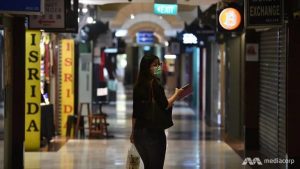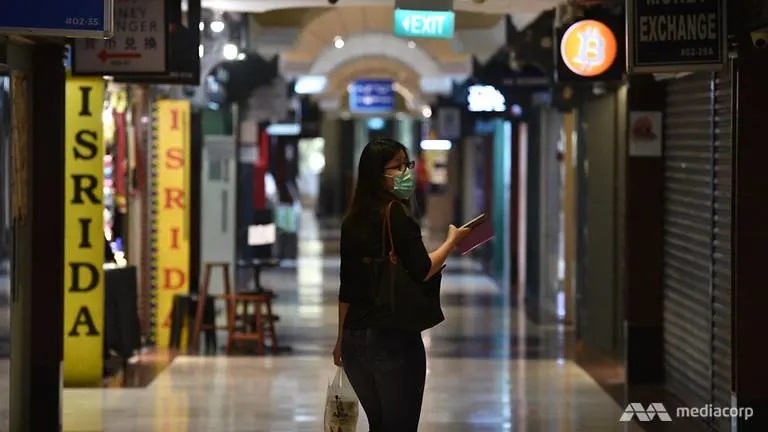
The Arcade at Raffles Place almost deserted during lunch hour on Jun 9, 2020. Before the COVID-19 pandemic, this building was usually bustling with people visiting money changers.
SINGAPORE: Singapore’s unemployment rate climbed to its highest in a decade and total employment fell to a record low in the first quarter of this year, as the labour market felt the early effects of COVID-19.
According to the latest labour market report released by the Ministry of Manpower (MOM) on Monday (Jun 15), the overall unemployment rate crept up from 2.3 per cent in the previous quarter to 2.4 per cent.
The unemployment rate among Singapore citizens rose from 3.3 to 3.5 per cent, and among residents – or Singapore citizens and permanent residents – from 3.2 per cent to 3.3 per cent.
The resident long-term unemployment rate, referring to individuals unemployed for at least 25 weeks, remained at 0.9 per cent.
Retrenchments rose from 2,670 to 3,220 in the first quarter, largely due to sectoral downturns, MOM said.
The ministry found that 1,537 local employees were affected by business closures in the first quarter of this year, which is more than double the 628 from the previous quarter.
An additional 4,190 employees were placed on shorter work hours or furloughs – a five-fold increase from the 840 in the preceding quarter, but lower than the 26,530 during the peak of the global financial crisis.
MOM said that this means employers are choosing to make temporary adjustments to manage excess manpower and reduce business cost instead of letting people go.
JOB VACANCIES DWINDLE
The ratio of job vacancies to unemployed persons tumbled to the lowest in a decade, from 0.84 to 0.71 in the first quarter. This means there were only seven openings for every 10 unemployed people in Singapore.
There were 46,300 job vacancies in March this year, compared to 52,700 in December last year.
The food and beverage, arts and entertainment, and administrative sectors saw the largest decline in job vacancies, while openings in areas like infocomm technology and healthcare increased.
Average weekly paid hours worked also went down by 0.3 hours over the quarter to 44.4 hours in March, reflecting a fall in paid overtime hours.
TOTAL EMPLOYMENT FALLS TO RECORD LOW
Total employment, excluding foreign domestic workers, recorded its largest quarterly contraction on record as it shrank by 25,600 in the first quarter after growing by 19,800 in the previous quarter.
This was more than the preliminary estimate of 19,900 MOM published in April.
The decline was more than what was seen during the severe acute respiratory syndrome (SARS) outbreak in the second quarter of 2003 and the global financial crisis in the first quarter of 2009, where employment contracted by 24,000 and 8,000 respectively. MOM said the drop was due to a significant fall in foreign employment, although local employment dropped as well.
Trade and tourism-related industries, as well as construction, were most severely impacted by reductions in employment.
The number of people employed in F&B, construction and retail trade – the three sectors with the sharpest employment declines – fell by 8,300, 5,800 and 5,400 respectively in the January to March period.
On the flip side, public administration and education, professional services and financial services saw employment grow by more than 2,000 each, although gains in these sectors were not enough to balance out the losses in others.
Speaking ahead of the report’s release on Friday, Manpower Minister Josephine Teo cautioned that the full effects of COVID-19 were not yet felt in the first quarter.
Activity levels in January were still quite high given the new year festivities, she said. And though tourism had been badly hit since February, most travel restrictions were not yet in place and the “circuit breaker” did not take effect until April.
However, Mrs Teo said that the report showed some “silver linings”.
Referring to the unemployment rate, she said that while it crept up, it did not spike as the Government’s job and wage support measures provided some cover.
And though retrenchments increased, there were many more employees placed on shorter work weeks or temporary layoffs.
“It suggests that the measures that are supported by the tripartite partners, although they do involve some sacrifices, especially on the part of the workers, they are also helping to preserve jobs,” she said.
As for the future, Mrs Teo said that Singapore has to get ready for more layoffs and to help those who have lost their jobs.
“We have to try our very best to open up more pathways for the job seekers,” she said, citing the national jobs strategy that aims to create 100,000 job opportunities. Part of the strategy is to have the public sector bring forward its hiring plans.



